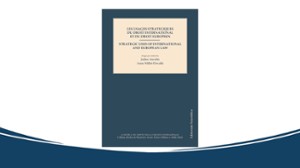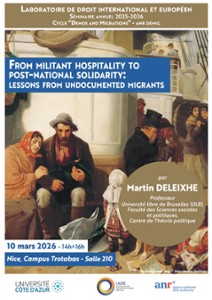This workshop is part of the two-month research visit to Nice by Theresa Reinold as IdEX guest researcher.
Theresa Reinold, Junior Professor, Chair of Global and Transnational Cooperation Research, Universität Duisburg-Essen, who has been a visiting researcher at Leiden University, New York University, Harvard University and Yale University, is currently conducting research for LADIE as part of a cross-disciplinary approach between the Lawfare project led by Julien Ancelin and the Order and Disorder project led by Daniel Ventura.
The aim is to apply to a common subject – the European Public Prosecutor’s Office – a methodology that involves questioning the foreign policy discourses that mobilise international law and the conditions in which law is instrumentalised in support of political objectives, to analyse the crisis of multilateralism systematically, starting from a study of its essential causes rather than its symptoms.
The evolution of European criminal law has been a deeply contested and non-linear political process, marked by setbacks, ideological confrontation, and concerns over the sovereignty costs of setting up a novel institution with supranational powers. Yet even though the consolidation of European criminal law was stalled and obstructed at many junctures, the launch of the European Public Prosecutor’s Office in 2021 represented a major step forward in the fight against crime and corruption in the EU.
Yet even though this novel institution has been wildly successful in the first years of its existence, the EPPO is currently struggling to assert itself in the face of continuing attempts at political interference, institutional corruption, and obstructionism on the part of some of its member-states. As it was observed in a recent media commentary, EPPO investigations “are hitting brick walls” with states adopting a broad range of lawfare tactics designed to prevent the EPPO from carrying out its work effectively – ranging from manipulating the selection process of EPPO personnel in order to ensure that only loyalists are appointed, to tampering with national legislation with the goal of sabotaging effective fraud and corruption investigations, to not reporting cases and thus preventing the EPPO from becoming active in the first place, etc.
The EPPO’s third birthday on 1 June 2024 therefore provides an excellent stock-taking opportunity to reflect upon the challenges this novel European institution has faced during the first three years of its existence, including the lawfare waged against the Office by various member-states including Malta, Slovenia, Slovakia, Bulgaria, and others. The anniversary also provides an occasion to discuss the implications of these strategies for the crisis of multilateralism and the future of multilateral institutions.



